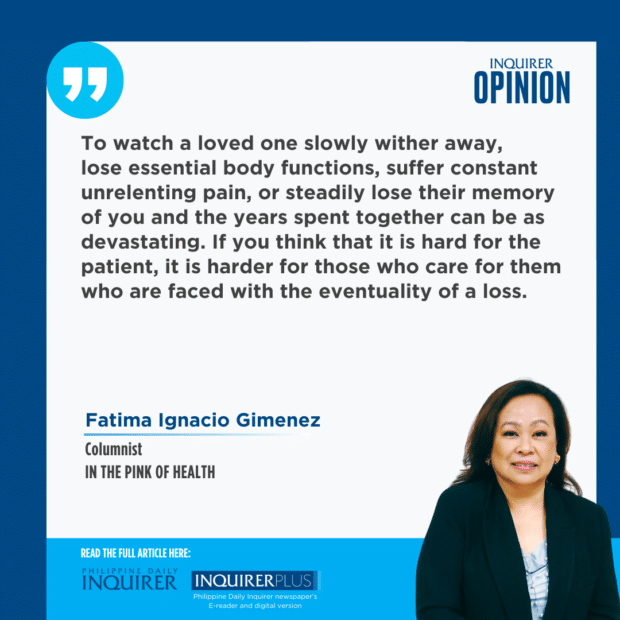Who cares?

Would you happen to know of people or places that provide palliative care?”
I had reconnected with a relative from the United States and was at a loss on whom to refer him to. His wife had been diagnosed with dementia and he wanted to ensure that she would be properly attended to. From where they lived in the US, cost was prohibitive and there were no dedicated caregivers. She might be better off if they came home to the Philippines.
“So how do you break the news?” On several occasions, this question has been posted to friends who have long been in the practice of hematology and oncology. They all agree and say that it’s never easy, but as their attending, the parents deserve to know the truth, that they have reached the end of the road, and it would just be a matter of time before they lose their child to the condition. Being in the practice of pediatric infectious disease, inevitably, we often are called to be part of the team when things get complicated in the face of immunosuppression. Personally, I have always marveled at how my colleagues are able to stay in a subspecialty where there is that constant possibility that one becomes extremely emotionally attached. A female colleague told me that she needs to keep her distance or she would “lose it.” A friend who is married to a pediatric hematologist-oncologist shared that she now has a better understanding on why it is important that her husband be given some quiet time at the end of the day.
Article continues after this advertisementWhile we are deeply concerned about the challenges faced by the patient, we often overlook the difficulties experienced by their caregivers, who typically consist of immediate family members. To watch a loved one slowly wither away, lose essential body functions, suffer constant unrelenting pain, or steadily lose their memory of you and the years spent together can be as devastating. If you think that it is hard for the patient, it is harder for those who care for them who are faced with the eventuality of a loss.
So how to navigate? There is no algorithm to follow. Having gone through that route I hope these pieces of advice will be of help.
First, get a physician who is competent, aware of his limitations, has a reliable dependable network, a team player, and easy to reach. Communication is essential in order to develop a mutually healthy and beneficial relationship. As doctors, we would appreciate knowing that a patient’s family not only understands the enormity of their relative’s health challenges, but also of the support that is available in terms of financial and human resources. This is of great assistance in planning our next course of action in terms of management. Knowing how a chronic illness can take its toll on their finances, any intervention should always be cost-efficient.
Article continues after this advertisementSecond, make sure that there is a clear delineation of responsibilities among the family members. Though it is advisable that there should always be one central lead that would run the ship, each one should be made accountable. Having said that, as the captain you should also be inclusive and open to suggestions. Physical and emotional fatigue can sometimes cloud judgment. Be sensitive to both the patient’s needs and those who are involved for there is that real danger of caregiver fatigue. One cannot give from an empty cup. Be ready to step up when needed.
Third, at the onset, let your circle of support know about your strengths and weaknesses. This goes a long way in conserving energy and preserving harmony within the group. I remember a particular conversation with my siblings when we were handed the sad news that there were no other available options for my father whose cancer had metastasized. Fighting back tears, I told them that all medical decisions and interventions would be care of me, but they had to promise that upon his demise, they would be the ones to take over. I was still a long way off in terms of accepting reality and the inevitable. When that day came, as they always do, they kept their word.
Unconditional love and support are the best gifts that anyone can offer to those who suffer from the pain and the anxiety that a chronic condition brings. The inevitable loss of personal control is daunting enough, not to mention the fear of the unknown. Only a few can say that they are fully ready to pass on to a better place.
Learn to be a steward of affection. Be there to embrace them with heartfelt words and actions that would make them feel that you are with them and will always be there for them.
One can’t care enough.
—————-
timmygimenez@gmail.com
















